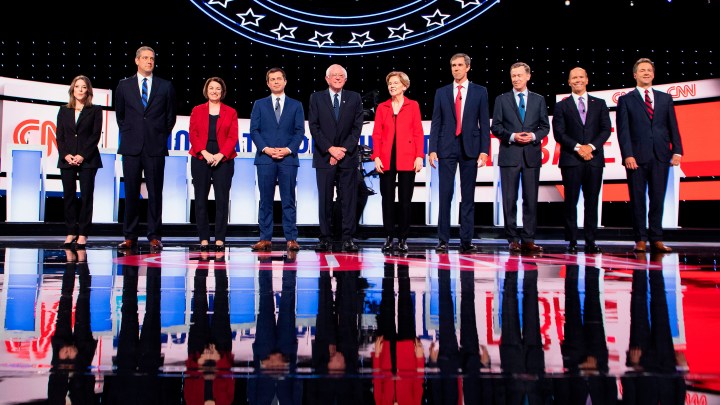
The business behind political donations made online

The Democratic debate in Houston on Thursday is the next opportunity for presidential candidates to convince Democratic voters they can beat President Donald Trump. It’s also an opportunity for all candidates, Democrat and Republican, on stage and off, to ask for more money — online donations, in particular.
Every time someone donates online, there’s a fee, usually of around 3% or 4%, sometimes with an additional fee per contribution. Some of that goes to the credit card companies and some goes to the processing platform. For Democrats, that platform is almost always ActBlue.
“We will end up working with pretty much every registered Democrat on the federal level, and at the state, local, down to the municipal level, across the country,” said Erin Hill, ActBlue’s executive director. “We’re on track for about 30,000 folks who will use us, and a lot of these folks will use us in conjunction with other digital tools, as well.”
Hill said one of the reasons ActBlue has become so ubiquitous for Democratic and progressive campaigns is its existing donor base. Hill said more than seven million donors have saved their payment details to expedite future donations, potentially to other candidates and causes.
“And when they have that done,” said Hill, “they’re able to give just by choosing which candidate, which organization, and how much.”
ActBlue is a non-profit political action committee (PAC), but its success has spawned plenty of for-profit competitors.
“There’s so much political money flowing around right now that the ecosystem can support plenty of different platforms,” said Colin Delany, editor of Epolitics.com. He’s been following the growth of online political donations since they started picking up steam with the campaign of Howard Dean in 2004.
Delany pointed to platforms like NGP Van on the left (which also provides a broader suite of technology services to Democrats), and Anedot, which is popular with conservatives via Right.us. Some political consultants also have their own payment platforms.
Recently, the Republican National Committee launched WinRed as its official platform. The PAC is a joint venture of President Trump’s re-election campaign and the RNC.
“The Republican Party is trying to create an ActBlue equivalent,” said Delany. “They’re doing it differently than the Democrats did, though, because they’re trying to require campaigns to use it.”
So far, that’s been rough going, with several reports of individual campaigns balking at the switch, and several state parties and Senate campaigns still haven’t moved over.
On top of that, other campaigns seem to be blocked from the platform altogether. Among them, former congressman and presidential challenger, Joe Walsh.
“It probably will not surprise you to learn that, lo and behold, WinRed was not interested in working with the ‘Walsh for President’ campaign,” said Lucy Caldwell, campaign manager for Walsh. She said restrictions on use of the platform hold Republican fundraising back.
“I think that software really serving the purpose of being software, not the purpose of picking winners and losers, is a really good thing for donors and for our system of democracy overall,” Caldwell said.
WinRed declined an interview with Marketplace. For now, Trump’s primary challengers: Walsh, former Massachusetts Governor Bill Weld, and former Congressman Mark Sanford, are all using Anedot. All of the 2020 Democratic presidential campaigns are using ActBlue.
There’s a lot happening in the world. Through it all, Marketplace is here for you.
You rely on Marketplace to break down the world’s events and tell you how it affects you in a fact-based, approachable way. We rely on your financial support to keep making that possible.
Your donation today powers the independent journalism that you rely on. For just $5/month, you can help sustain Marketplace so we can keep reporting on the things that matter to you.












